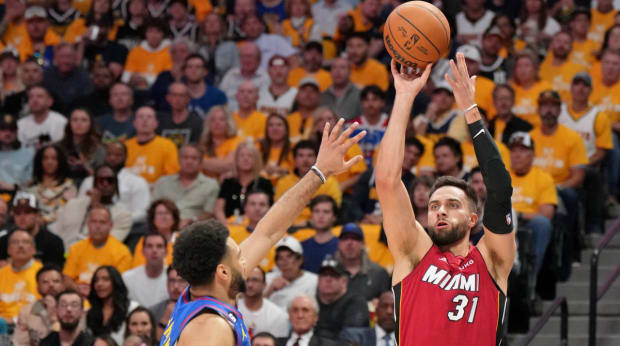The Nuggets took a 1–0 lead in the Finals with a 103–94 win on Thursday. Denver led for most of the night, and broke Miami’s streak of six straight wins in Game 1s.
Here are three takeaways from Denver’s win.

Kyle Terada/USA TODAY Sports
The Heat’s shooters went cold
Miami’s offensive process was actually quite good in Game 1. Bam Adebayo took 25 shots, one indicator of how the Heat generated open look after open look from the pocket in the pick-and-roll. Taking advantage of drop coverage, Miami found space offensively. The issue? The Heat couldn’t hit their jumpers. Miami shot 13-of-39 from three, with Duncan Robinson, Max Strus and Caleb Martin combining to hit only two of their 16 attempts from deep. Meanwhile, Jimmy Butler scored on only two of his nine shots that came from outside the restricted area. These are the looks the Nuggets defense will give up. The Heat were able to make many of these same shots at what some would say was an unsustainable rate in the first three rounds of the playoffs. If Miami can’t make Denver pay from the open areas of the floor moving forward, this will be a short series.
Miami couldn’t pass the Jokić-Murray test
In his first Finals game, Nikola Jokić posted a 27-14-10 triple-double and hardly seemed to break a sweat. Meanwhile, Jamal Murray added 26 points of his own. Combined, Murray and Jokić shot 19-of-34 from the field. Miami didn’t have much of an answer for their two-man game. The Heat played a fairly conservative coverage, dropping on picks and handoffs, while Murray’s defender was generally in a trail technique. The Nuggets’ stars were able to take advantage routinely. Whenever Jokić had a smaller player on him in the paint, the Heat sent help and he sprayed the ball all over the floor. Jokić also scored one-on-one against Adebayo with relative ease. Simply put, Jokić and Murray have the most lethal two-man game in the known universe right now. No team has an answer, and Miami didn’t seem to strike much fear into the Nuggets. The Heat’s zone had some more success in the fourth quarter, and while that strategy could yield some rewards, it’s also high risk.
Miami is undoubtedly in a pickle. Because the more help they send at Jokić and Murray, the more cracks the Heat leave open for Denver’s role players. Aaron Gordon, for example, feasted early in the game, using his size to attack the paint while Jokić happily fed him the ball over and over again. I have no idea what the answer is, but that’s why Erik Spoelstra is being paid the big bucks.
Denver’s role players had the upper hand
Miami’s conference finals heroes struggled immensely Tuesday. Caleb Martin made only one of his seven shots in 25 minutes. Max Strus missed all 10 of his field goal attempts. Outside of some bright spots from Kyle Lowry and Haywood Highsmith, the Heat couldn’t replicate what brought them success in the previous round. Coupled with a strangely passive game from Butler, the Heat looked stuck offensively.
Not the case for the Nuggets. Bruce Brown came off the bench to hit a couple floaters and a couple threes. Michael Porter Jr. flew around the floor, compensating for his iffy outside shooting with two blocks, 13 rebounds and some timely offense. Gordon not only used his size to bully Miami in the first quarter, but he played solid defense on Butler. Yes, Denver’s stars outpaced the Heat’s, but its role players were also much better on the whole. That’s going to be a recipe for a Nuggets win every time unless the Heat can get some of their supporting cast going.







